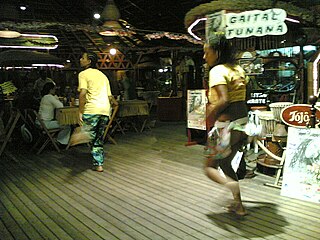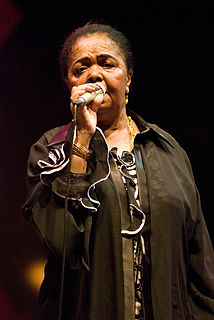
Cape Verde is known internationally for morna, a form of folk music usually sung in the Cape Verdean Creole, accompanied by clarinet, violin, guitar and cavaquinho. Funaná, Coladeira, Batuque and Cabo love are other musical forms.

The funaná[funɐˈna] is a music and dance genre from Cape Verde. Funaná is an accordion-based music. The rhythm is usually provided by the ferrinho much like the use of washboards in zydeco, the saw in Caribbean ripsaw music, the scraper in Sub-Saharan African music and the güiro in Latin and Pre-Columbian music.
The coladeira is a music genre from the Cape Verde islands in the central Atlantic Ocean.
Suzanna Lubrano is a Cape Verdean Zouk singer based in Rotterdam. Several albums have gone Gold and Platinum, while she has won major international music awards.
Ildo Lobo was a Cape Verdean singer. His versatile and melodic voice, commanding stage presence and trademark berets made him one of the most recognizable performers in Cape Verde. Always well known throughout the Cape Verde Islands, Lobo rose to international fame with his first solo work, "Nôs Morna", following it with another album "Intellectual".
Maria de Barros is a singer most associated with Cape Verde, the land of her parents. Growing up in Nouakchott, Mauritania, she moved to the United States at the age of 11, living in Providence, Rhode Island in her youth with her four siblings, and connecting more closely with her heritage in the local Cape Verdean community. She is married to, Mel Wilson Jr., a bassist with Toots and the Maytals.

Jorge Vera-Cruz Barbosa was a Cape Verdean poet and writer. He collaborated in various reviews and Portuguese and Cape Verdean journals. The publication of his poetry anthology Arquipélago (Archipelago) in 1935 marked the beginning of Cape Verdean poetry. He was, along with Baltazar Lopes da Silva and Manuel Lopes, one of the three founders of the literary journal Claridade ("Clarity") in 1936, which marked the beginning of modern Cape Verdean literature.
The Batuque is a music and dance genre from Cape Verde.
Adriano Gonçalves, known by his stage name Bana and called the "King of Morna", was a Cape Verdean singer and performer of the morna style, the plaintive, melodic lament which is a staple musical style of the country.
Tabanka is a musical genre of Cape Verdean music.

Nancy Vieira is a Cape Verdean singer who was born in Guinea-Bissau and currently resides in Portugal.
Lela Violão, born Manuel Tomás da Cruz was a Cape Verdean singer and composer.

Lusafrica, full name: Productions Lusafrica is a multinational independent record label company based in Paris, France. The company was founded in 1988 by José da Silva, it was the first multinational record company opened in Cape Verde and one of the first in France. It is the main African independent label in France.

For the Brazilian footballer, see Mário Lúcio da Silva Junior

Os Tubarões was a Cape Verdean traditional music band who, along with Bulimundo, Finaçon and Simentera, were among the most famous music bands in Cape Verde. The band name is Portuguese for "the sharks" which are common in the waters surrounding the archipelago.

Quintal da Música, abbreviation: 5tal da Música is a music pub located in the downtown area of Praia, the Plateau and is located at 70A Avenida Amílcar Cabral in the northern part of the center, across Rua António Pusich and south of Rua António Macedo. It is one of the most famous and most used pubs and music pubs in Cape Verde.
The Culture of the Island of Santiago, Cape Verde is the richest in the nation, with a range of customs and practices common in the islands,
The Culture of the Island of São Vicente, Cape Verde is the second richest in the nation, with a range of customs and practices common in the islands,
Pedro Monteiro Cardoso was a Cape Verdean writer, poet and folklorist.








